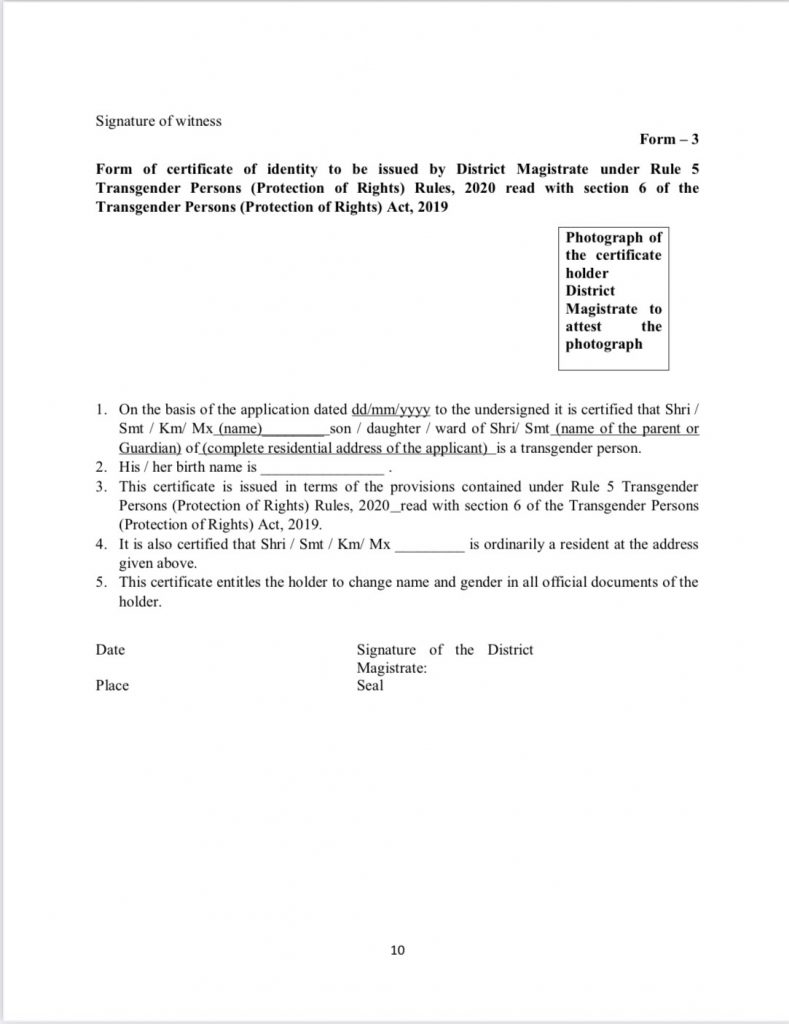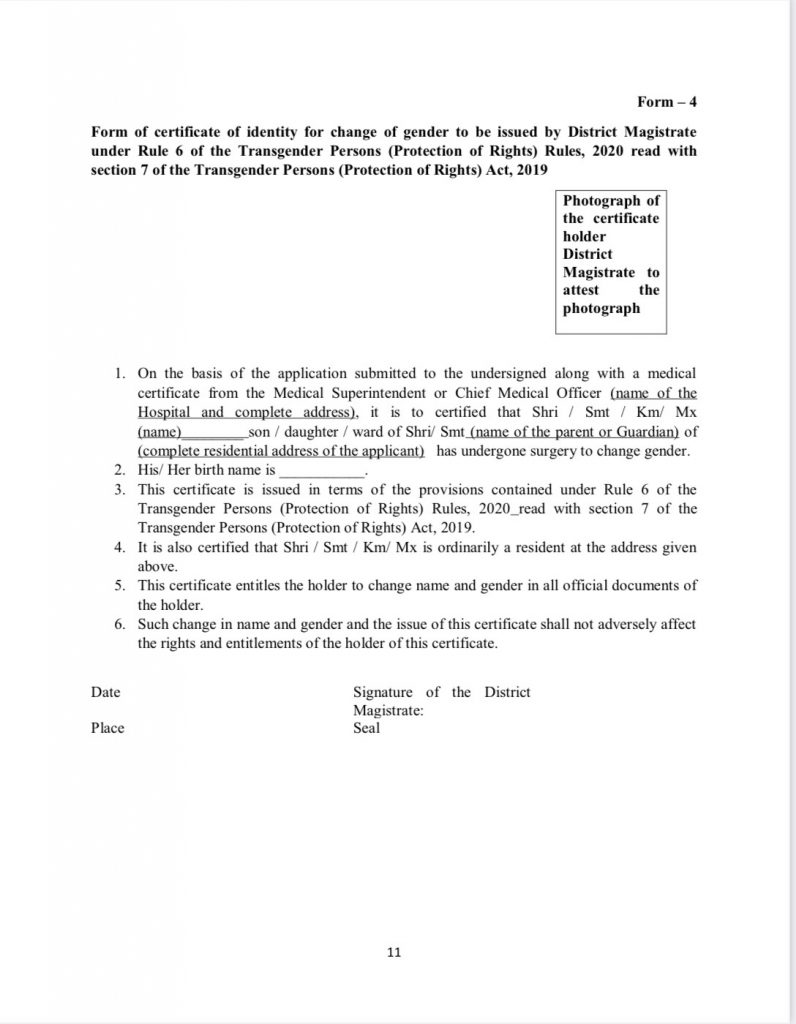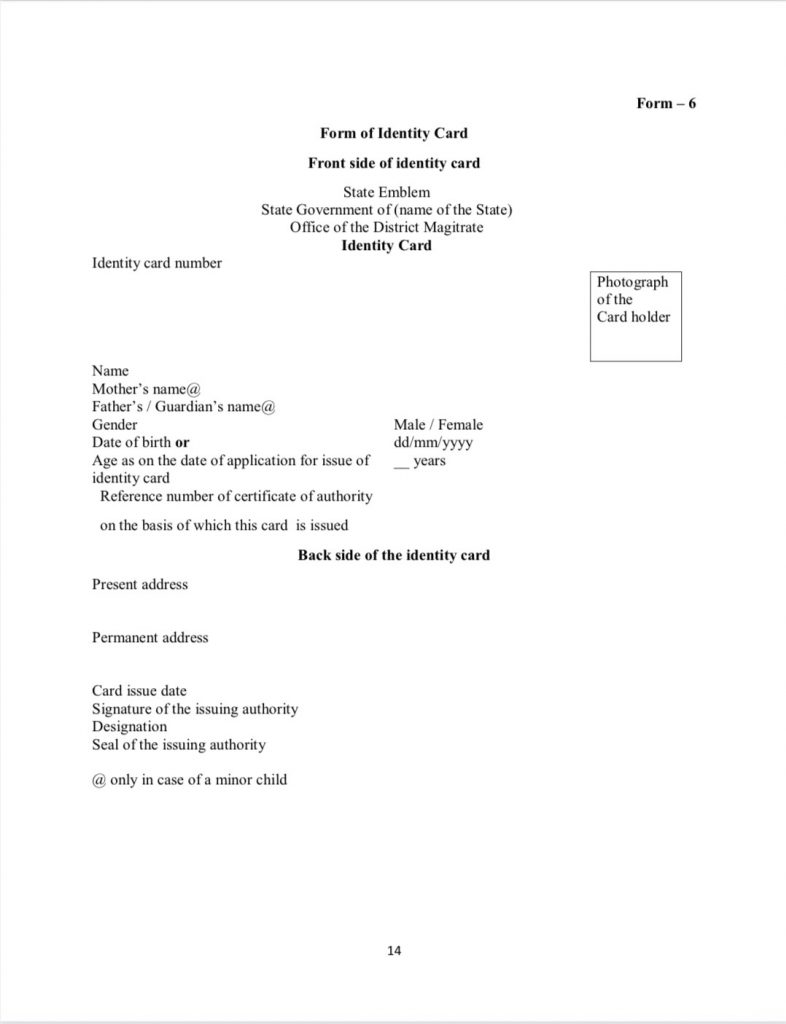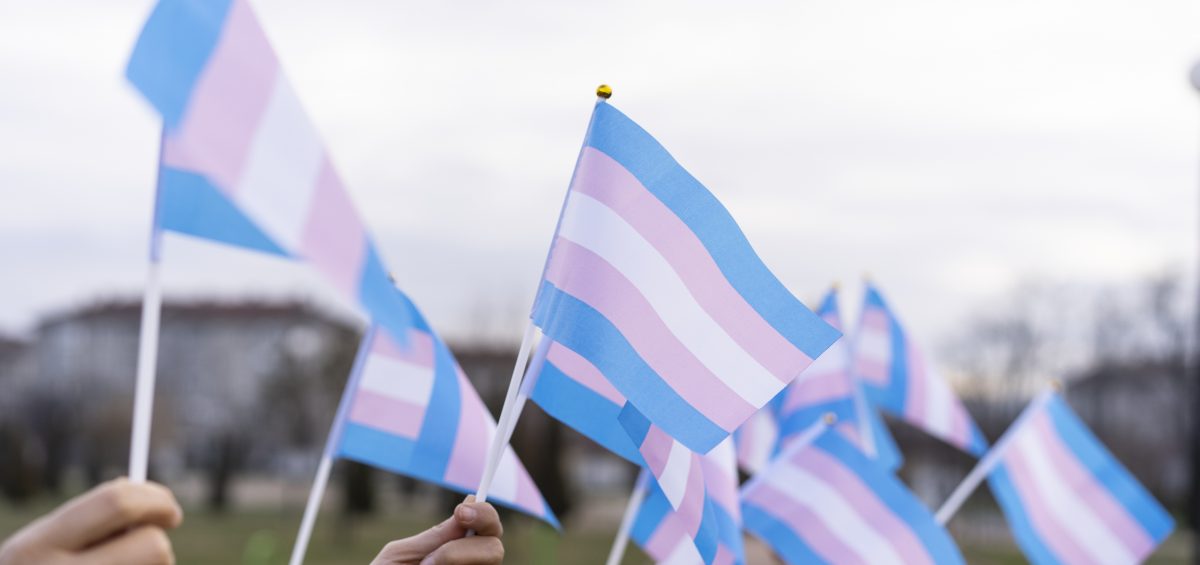What laws are discussed in this Guide?
This Guide discusses the general provisions in the Constitution of India, the Transgender Persons (Protection of Rights) Act, 2019 and the Transgender Persons (Protection of Rights) Rules, 2020.
Why was the law enacted?
Transgender Persons are not treated as an equal part of society due to lack of social acceptance. Transgender Persons are usually abandoned and
have fewer means for survival and avenues for gaining livelihoods. Parents tend to feel that it is dishonorable to have a transgender person as it will bring shame on the family. Another issue is that of marriage. This Act aims to solve the above issues and more.
What is the objective of the law?
The Transgender Persons (Protection of Rights) Act, 2019 (“the law”) has been drafted and formulated to protect the rights of Transgender Persons in India, and provide for their welfare. This law is applicable to the whole of India.
Who is a Transgender Person?
As per the law, a Transgender Person is a person whose gender does not match with the gender assigned to that person at the time of birth, and includes:
• Trans-man
• Trans-woman
• Person with inter-sex variations
• Gender-queer persons
• Persons with socio-cultural identities such as
kinner, hijra, aravani and jogta
What is the legal status of a Transgender Person in India?
In India, Transgender Persons are legally recognised as the ‘third gender’ or ‘other’ gender.
They have the same status as that of any male or female person. They also have the same rights, including the right to exercise their fundamental rights under the Constitution of India. The Supreme Court in 2014 officially declared ‘transgender’ as the ‘third gender’ in India via the landmark judgment NALSA V. Union of India & Ors (2014)
The court held that all transgender persons are entitled to fundamental rights under Article 14 (Equality), Article 15 (Non Disrimination), Article 16 (Equal Opportunity in Public Employment), Article 19(1)(a) (Right to Free Speech) and Article 21 (Right to Life) of the Indian Constitution. In 2020, the parliament legally recognized ‘transgender’ as an official gender in India.
Gender Identitiy of a Transgender Person
What is gender identity?
‘Gender identity’ refers to a person’s internal sense of being of a particular gender. This choice is made when a person understands their internal and individual experience of their body, bodily appearance, speech, mannerisms, etc. If a person does not identify themselves with the gender that they are assigned during birth, they can choose to identify with some other gender.
What are the medical options to change your gender identity?
The process for recognizing, accepting and expressing your gender identity is known as transitioning. It can be achieved through the following medical options:
- Hormone Therapy: This is a form of medicine which helps to increase or decrease a person’s sex characteristics.
- Gender Affirmative Therapy (GAT): This is a set of procedures, ranging from psychological counselling to sex reassignment surgeries, which aim to change a person’s appearance so that it will conform more strongly with the self-identified gender. For example, Rita was identified to be female at birth, but while growing up, identifies themselves as male, and may undergo GAT to masculinize their appearance through breast removal surgery, etc.
- Corrective surgery/intersex surgery: These procedures modify sex characteristics and genitals when they are anomalous, meaning when there is no clear distinction between male and female genitals. For example, a child, Nakul, is born with both male and female genitalia, and decides that he self-identifies and feels that his gender is male, and thus undergoes corrective surgery to align more strongly to the male gender.
| It is not mandatory for a person to undergo any physical change/medical procedure to choose their gender identity. The laws in India recognise a person’s physiological right to choose their gender identity based on what they are feeling. The person’s physical characteristics do not affect the gender identity that they have chosen. |
Does the law permit a person to choose their gender identity?
Yes! The law does permit a person to choose their gender identity.
In the landmark case of National Legal Service Authority v. Union of India and Ors.(2014), the Supreme Court identified the rights of the transgender community as a “third gender.” The Central and the State Governments were also asked to formulate and regulate social welfare schemes and other necessary provisions for the protection of transgender rights.
Case Study: In the case of Anjali Guru Sanjana Jaan v. State of Maharashtra & Ors. (2021), the Bombay High Court observed that for the Village Panchayat elections, the petitioner identified herself as a female while she was a transgender and her application was rejected. The court held that the petitioner had the right to self-identify her gender and accepted her application.
| Note: Central and State Governments too have to take steps in recognizing third gender persons as a “socially and educationally backward class of citizens” who are entitled to reservations in educational institutions and public employment. The Government also has a duty to make provisions for the legal recognition of “third gender” in all documents. You can read the Nyaaya explainer on Identification proof for LGBTQ+ for more information. |
Can you officially record a person’s gender identity?
The Transgender Law explains how you can officially record your gender as a transgender person:
Step 1- Make an application to the District Magistrate for issuing a certificate of identity as a Transgender Person. For a minor, the application should be made by the parent or legal guardian of the child. If the parent/legal guardian does not make the application, then the person can apply after becoming a major (i.e., once they are 18 years of age or above). The procedure may be different for each district, so it is advisable to check with your district for particular requirements.
Step 2- The District Magistrate will issue a certificate of identity against the submitted application.
Step 3- The gender of the Transgender Person will be recorded in the official records maintained by the District Magistrate’s office.
Step 4- If a Transgender Person undergoes sex-reassignment surgery after the issuance of the identity card, then the new gender will be communicated by the transgender person to the District Magistrate along with a certificate from the Medical Superintendent or Chief Medical Officer.
Step 5- The District Magistrate will issue a revised certificate.
An example of the application form and the affidavit is given in the sample forms section below.
What are the documents required for getting an Identity Card issued?
Given below are some of the documents you can use to get an Identity Card issued to you:
| S. No | Name of the official document |
| 1. | Birth Certificate |
| 2. | Caste/Tribe Certificate |
| 3. | Class 10 (Secondary school) certificate or Class 12 (Senior Secondary School) certificate or SSLC |
| 4. | Election( Photo) Identity Card |
| 5. | Aadhaar Card |
| 6. | Permanent Account Number (PAN) |
| 7. | Driving Licence |
| 8. | BPL ration card |
| 9. | Post Office Bank/Bank Passbook with photo |
| 10. | Passport |
| 11. | Kisan Passbook |
| 12. | Marriage certificate |
| 13. | Electricity/water/gas connection bill |
| Note: This is a tentative list of documents. You can reconfirm these as well as ask for more options at your nearest local District Magistrate’s office. |
What happens once a person officially records their gender identity as a transgender person?
Once a person officially records their gender identity, they will receive an official Certificate of Identity as a Transgender Person. The certificate will serve as a proof of their identity as a Transgender Person. The said person’s gender will be recorded as ‘Transgender’ or ‘Third Gender’ on all official documents.
| Case Study: A writ petition was filed seeking measures by the State Government for the distribution of food ration, medicines and access to medical treatment to the transgender community in Kerala. The Court observed in the case of Kabeer C Alias Aneera Kabeer v. State of Kerala(2020), that necessary steps should be taken to ensure issuance of gender identity card and the ration card to transgender persons. |
Laws Protecting Transgender Persons
Does the Indian Constitution protect the Transgender Persons?
Yes. Some of the important provisions in the Constitution protecting transgender rights include:
- Right to Equality (Article 14) : No one can deny any “person” equality before the law or equal protection of law. Using the term “person” shows that no discrimination is done on the basis of sex or gender identity.
| ‘Transgender Persons’ cannot be subjected to unfair treatment in educational institutions or at the time of employment. They also have the right to equal health services, and the right to use public property or the right to freely move in the country. |
- Prohibition of discrimination on various grounds, including gender (Article 15) : Prohibits any sort of discrimination on the basis of race, religion, caste or sex or any of them. This implies that discrimination or ill-treatment of Transgender Persons infringes their basic fundamental right. In the case of Mx. Alia SK v. The State of West Bengal and Ors.(2019), the court held that Transgender persons have the right to seek admission into universities. The judgement is important because it signified the role of courts in ensuring that special accommodations and adjustments are made to include transgender people in the process of public university applications and admission process where none exist.
- Freedom of speech and expression (Article 19) : This right grants every citizen the freedom of speech and expression. This includes the freedom to express your gender identity publicly.
- Right to life and personal liberty (Article 21): Article 21 which deals with the protection of life and personal liberty states that no person shall be deprived of his life and personal liberty except according to the procedure of law. This right states that every individual including a transgender person has the right to life and personal liberty. The transgender person being a citizen of India should have the full right to protect their life and personal liberty.
| In the case of Nangai v. Superintendent of Police (2014) , the Madras High Court recognized that compelling a person to undergo a medical examination of gender violates Article 21. It upheld a person’s right to self-identify their own gender. |
Are there any reservations for transgender persons?
Yes, under the Transgender Persons (Protection of Rights) Rules, 2020, Central and State governments can classify them as ‘Other Backward Classes’ for the purposes of vertical reservation.
What other laws protect the rights of a transgender person in India?
- The Transgender Persons (Protection of Rights) Act, 2019 & Rules: This Act was passed in the year 2020 and it provides Transgender People several rights. The rules act supplementary to the Act.
- SC/ST (Prevention of Atrocities) Act, 1989: If an individual belongs to the Scheduled Caste or Scheduled Tribe community, this law protects that person from any sort of caste/tribe based discrimination.
| In the case of Mx Sumana Pramanik v. Union of India (2020), the court reiterated the importance of not just reservations for the transgender community, but also age relaxations and fee concessions for them in examinations. Wherever these provisions for reservations have been made, the Government has to enforce it. |
- NALSA Judgment: In the landmark judgment National Legal Services Authority v. Union of India and Ors. in 2014, the Supreme Court identified the rights of the transgender community as a “third gender”. This case paved the way for transgender persons with the right to choose their gender identity and live their life with dignity.
| In the case of G. Nagalakshmi v. Director General of Police (2014), the Madras High Court observed that in the absence of any special law, any person has the liberty to choose their sexual or gender identity, and upheld the petitioner’s right to choose their own gender. |
- Puttaswamy Case: In the landmark judgment Puttuswamy v. Union of India (2017), with regard to the right to privacy, the Supreme Court observed that there is a constitutional right to privacy inherent in the right to life, equality and fundamental freedoms. This includes the right to have intimate relations of one’s choice and the right to sexual orientation and gender identity.
- Decriminalisation of Section 377 of IPC: The Supreme Court in the case of Navtej Singh Johar v. Union of India(2016) held that LGBTQ+ people in India are entitled to all constitutional rights, including the liberties protected by the Constitution of India.
- Indian Penal Code, 1860: Any offence committed by a Transgender Person shall be punished as per the provisions of the Indian Penal Code. The case of Mrs. X v. State of Uttarakhand (2019) affirmed the NALSA Judgement and stated that a denial of the right to self-identify one’s gender would deny the right to life and liberty. It is especially significant since it is one of the first cases that affirmed the right to self-determination based on the “psyche” of the individual even in the context of the criminal law.
| Many people face violence in various forms such as physical, sexual, mental or emotional violence due to their sexual orientation or identity. It is important to identify this violence and reach out for help or to take action to stop the violence. Read the Nyaaya explainer on Violence Based on Gender Identity and Sexual Orientation to understand the violence faced by people based on their sexual orientation or gender identity. |
- Code of Criminal Procedure, 1973: A transgender person is subject to the same criminal procedural law of arrests, bail, summons, investigation etc.
| The National Crime Records Bureau publishes an Annual Prison Statistics India report which includes the composition of prisoners. In Karan Tripathi v. NCRB, WRP (Criminal) No. 9596 of (2020), the Delhi High Court stated that now NCRB intends to include transgender in the gender classification of prisoners from PSI-2020. |
What can be done if Transgender rights are violated?
The National Council for Transgender Persons was set up under the Transgender Persons (Protection of Rights) Act, 2019 for addressing grievances.
Furthermore, violations of Part III rights of Transgender persons can be remedied by approaching the Supreme Court or High Courts under Articles 32 or 226. In addition, other rights guaranteed under various laws are protected by Article 226.
Moreover, violation of rights to the ‘third gender’ constitutes human rights abuse. The State and National Human Right commissions can be approached by the victim.
What is the procedure to file complaints against discrimination of Transgender Persons?
For those facing discrimination during the course of employment, either in public or private sector, do approach the designated complaint officer set up under the the Transgender Persons (Protection of Rights) Act, 2019[1].
For filing a grievance with the National Transgender Council, create an account online in the National Transgender portal (https://transgender.dosje.gov.in/). On successful registration, click on the ‘Grievance tab’ on your dashboard. Detailed guidelines for the same can be found here – (https://transgender.dosje.gov.in/docs/Manual.pdf)
If I decide to approach the Court directly, how can I get legal aid services?
You can approach your nearest District Legal Services Authority for availing legal aid. If your annual income is less than the ceiling limit prescribed for each state, then you can enjoy these services for free.
Authorities under Transgender Law
What is the National Council for Transgender Persons (NCTP)?
National Council for Transgender Persons is a statutory body established on 21st August, 2020 by the Ministry of Social Justice and Empowerment. It advises the government on all policy matters affecting transgender, intersex persons and people with diverse GIESC (Gender Identity/Expression and Sex Characteristics) identities. The council is composed of-
- The Union Minister in-charge of the Ministry of Social Justice and Empowerment, Chairperson, ex officio;
- The Minister of the State, in-charge of the Ministry of Social Justice and Empowerment in the Government, Vice-chairperson, ex-officio;
- Various other representatives from different fields.
| The Council was formed on 21st August, 2020 with its headquarters in Delhi under the Ministry of Social Justice and Empowerment. The Council is headed by Mr. Thawar Chand Gehlot. Its regional members are Laxmi Narayan Tripathi, Gopi Shankar Maduari, Zainab P Rifai, Shayamchand Kokchitbomb, and Meera Parida. The expert members are Reshma Prasad, Aryan Pasha, Vihaan Peethamber and C. Ganeshdas. |
What is the role of the National Council for Transgender Persons?
The role of the National Council for Transgender Persons comprises of:
- Redressal of the grievances of Transgender Persons.
- To advise, monitor and evaluate the impact of policies made by the Central Government relating to Transgender Persons.
- To oversee the work of various Governmental and Non-Governmental organizations which are dealing with matters relating to Transgender Persons.
Personal Rights Of A Transgender Person
Does the law protect a transgender person from abuse faced from their family?
- Section 18 of the Transgender Persons (Protection of Rights) Act – This law protects all transgender persons against any form of abuse such as physical, verbal, emotional, sexual, mental and economic abuse by imposing the punishment of imprisonment for a term which shall not be less than six months but which may extend to two years and with fine. Unfortunately, it does not prescribe any separate mechanism to lodge a complaint against any of the abovementioned kinds of abuse.
Domestic Violence Act, 2005 – The Domestic Violence Act protects all women including Transgender Women (regardless of their Certificate of Identity) against any kind of abuse by any family member. You can read more in the Nyaaya explainer on Domestic Violence.
What can be done if the family of a transgender individual asks them to move out of their residence due to their gender identity?
As per the Transgender Persons (Protection of Rights) Act, it is illegal for any family to discriminate against the child or ask the child to move out of the house. All transgender people have the right to:
- – Reside in their family home
- – Make use of all the facilities in their family home without any discrimination.
If any parent or member of the immediate family is unable to take care of a Transgender person, the competent court shall by an order direct such person to be placed in a rehabilitation centre. (Section 12(3) of the Act)
Can anyone estrange or ask a transgender person to move out of their home or community?
The Transgender Persons (Protection of Rights) Act makes it illegal for anyone to separate a transgender person from their family or ask them to move out of their home, village or community. If anyone tries to commit this offence, then they shall be punished with imprisonment ranging from 6 months to 2 years.
As a transgender, do I have legally protected safe places to stay?
Yes, while transgender persons enjoy the ‘right to residence’ in their own homes, the Government has set up ‘Garima Grehs’ to help those without homes.
Are there any conditions to be met to reside in ‘Garima Grehs’?
The following conditions are to be fulfilled:
- Should possess certificate issued through the National Portal for Transgender Persons and preferably living below the Poverty Line
- Abandoned, aged above 18 years and below 60 years
- Not engaged in sex work and beggary
- Unemployed and not engaged in productive commercial activities
How to apply for a certificate on the National Portal for Transgender persons?
First, create an account online in the National Transgender portal (https://transgender.dosje.gov.in/). On successful registration, click on the ‘Apply online’ tab on your dashboard. Fill in the personal particulars and other details in the online form. Upload the affidavit declaring gender. This portal helps a transgender person to obtain an identity card without a physical interface. Detailed guidelines for the same can be found here – (https://transgender.dosje.gov.in/docs/Manual.pdf)
Marriage & Divorce
Can a transgender person get married in India? If so, under what law?
A transgender person can get married in India either under personal religious laws (for instance the Hindu Marriage Act or Indian Christian Marriage Act) or under the Special Marriage Act, 1954. In the case of Arun Kumar v. Inspector General (Madras) (2019), it was observed by the Madras High Court that a marriage solemnized between a male and a transgender women, both professing Hindu religion, was considered to be a valid marriage in the eyes of the law.
| Case Study: In the case of Chinmayjee Jena v. State of Odisha (2020), the Odisha High Court delivered the first judicial decision in India that explicitly recognizes the right of trans persons to enter into a live-in relationship with the partner of their choice, regardless of the “gender” of the partner. |
Can a transgender person file for divorce from their spouse?
If they are legally married, then they are eligible to file for divorce under the law under which they had gotten married initially. In case of live-in relationships, there is no legal requirement to get a divorce.
What are legal safeguards for a Transgender Woman facing abuse/harassment from their spouse/live-in partner?
Any person identifying themselves as a Transgender Woman and facing any form of abuse such as physical, emotional, economic or sexual abuse, is eligible for protection under the Domestic Violence Act. Read this Nyaaya explainer on Live-In relationships to understand more about protections under this law.
Protection Against Sexual Harassment
Does the law protect Transgender Persons against sexual harassment?
- Transgender Persons (Protection of Rights) Act – Under Section 18 of this Act, it is illegal for any person to sexually abuse any transgender person.
- Indian Penal Code – All transgender women can seek protection under all the sections of the Indian Penal Code protecting women from sexual abuse. This was mentioned by the High Court of Delhi in the case of Anamika v. Union of India(2020).
- Prevention of Sexual Harassment at the Workplace – If any transgender person faces sexual harassment at their school/college, then it will be considered as Sexual Harassment at the Workplace. Any transgender student is eligible to file a complaint with the Internal Complaints Committee of the said school/university.
Does the POSH Act provide any mechanism for the protection of the rights of the Transgender person against sexual harassment at workplaces?
In accordance with the requirements under the POSH Act, (The Sexual Harassment of Women at Workplace (Prevention, Prohibition and Redressal) Act, 2013), organisations shall put in place adequate grievance redressal mechanisms for transgender individuals to deal with harassment complaints, while keeping the identity of the complainant anonymous.
Public & Political Rights Of A Transgender Person
What are the duties of workplaces or establishments with regard to the welfare of the Transgender Persons?
Employers cannot discriminate on any issue relating to the employment of a Transgender Person. All establishments should comply with the provisions of the Transgender Law. They have the duty to designate a person as a complaint officer to deal with the complaints relating to the violation of this Act.
Does a Transgender Person have the right to use Public Transport?
Yes, all Transgender Persons have the right to use all forms of public spaces and transports intended for general use of the public. The Transgender Persons (Protection of Rights) Act makes it illegal for any person to prohibit the usage of public transport or space by a Transgender Person.
Can a transgender person vote?
Yes, just like any other gender, a Transgender Person who is a major (above 18 years of age) is also entitled to vote in India. The voter registration form also has the option of ‘other’ under the category of gender. Along with the right to vote, the Transgender Persons (Protection of Rights) Act provides that there shall be no discrimination in holding any public office, which means that a Transgender Person can contest in elections as well.
Resources
Sample Form
Application for Transgender Certificate of Identity








Contact Information
- Toll free number of Sahaay Helpline, aided by an international NGO and supported by Humsafar Trust, is functional 24×7 – 1800-2000-113.
- Any Transgender Person can connect with experts on the Helpline Number 8882133897 regarding their mental health. This helpline will be functional from Monday to Saturday between 11 AM to 1 PM and 3 PM to 5 PM. On this helpline, counselling services will be provided by professional Psychologists for their mental health.
- The Queerythm helpline- 9745545559. It is available in English, Malayalam and Tamil.
References
- The Transgender Persons (Protection of Rights) Act, 2019.
- The Transgender Persons (Protection of Rights) Rules, 2020.
- NALSA v. Union of India – AIR 2014 SC 1863.
- Puttaswamy v. Union of India – (2017) 10 SCC 1.
- Navtej Singh Johar v. Union of India – Writ Petition (Criminal) No. 27 of 2016.
- Arun Kumar v. Inspector General (Madras) – W.P. (MD) NO. 4125 OF 2019 AND W.M.P. (MD) NO. 3220 OF 2019.
- G Nagalakshmi v. Director General of Police ((2014) 7 MLJ 452) MADRAS HIGH COURT.
- Nangai v. Superintendent of Police – (2014) 4 MLJ 12 (MADRAS HIGH COURT).
- Anjali Guru Sanjana Jaan v. State of Maharashtra & Ors. (Writ Petition Stamp No. 104) – Bombay High Court.
- Mrs. X v. State of Uttarakhand – Writ Petition (Criminal) No. 28 of 2019 – Uttarakhand High Court.
- Mx Sumana Pramanik v. Union of India – Writ Petition Appeal No. 9187 of 2020 – Calcutta High Court.
- Karan Tripathi v. NCRB – Writ Petition (Criminal) No. 9596 of 2020 – Delhi High Court.
- Chinmayee Jena v. State of Odisha & Ors. – Writ Petition No. 57 of 2020 – Orissa High Court.
- Kabeer C Alias Aneera Kabeer v. State of Kerala – WP(C).NO.9890 OF 2020(S) – Kerala High Court.
- Mx Alia SK v. State of West Bengal & Ors. – W.P. NOS. 21587 (W) OF 2019 – Calcutta High Court.
- Ashish Kumar Misra v. Bharat Sarkar – MANU/UP/0332/2015 – Allahabad High Court.
- Anamika v. Union of India, W.P.(C) 4356/2020, Delhi High Court.
- https://blog.ipleaders.in/legal-rights-of-transgender-india/
- https://www.lexology.com/library/detail.aspx?g=b49d9488-c484-4d00-882c-2c386a041a07
- https://www.mondaq.com/india/discrimination-disability-sexual-harassment/905918/transgender-rights-the-third-gender39-and-transforming-the-workplace-in-india
- https://www.mondaq.com/india/employee-rights-labour-relations/851520/analysis-transgender-persons-protection-of-the-rights-bill-2019
Glossary Terms
- Trans-man: A transgender person who has transitioned from female to male.
- Trans-woman: A trangender person who transitioned from male to female.
- Person with inter-sex variations: People born with ‘intersex variations’ have characteristics that fail tofit the typical definition of a female or male body. Intersex variation can be physical, hormonal or chromosome-related.
- Gender-queer persons: Non-binary or genderqueer is an umbrella term for gender identities that are neither male nor female—identities that are outside the gender binary.
- Gender affirmative Hormone Therapy: Gender affirmation hormone therapy is medicine prescribed to help a person gain the outward characteristics that match their gender identity.





Leave a Comment